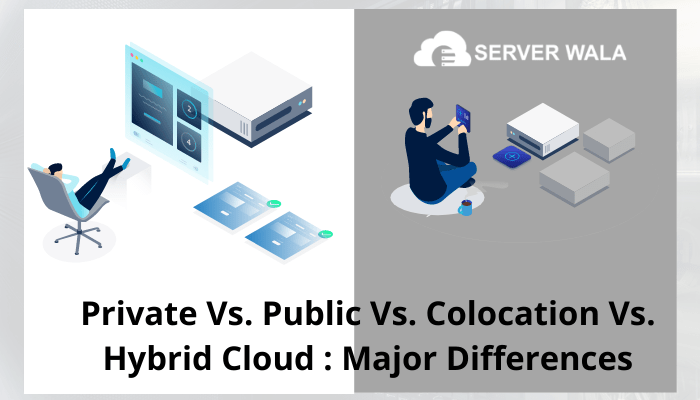Introduction
Once your business starts to grow or acquires pace, you will have to look for the right hosting service for your business that can provide efficient management, security, maintenance, network connectivity, and other crucial support to its data. That is because an ideal hosting provider will enable you to give your attention to the main aim of your business.
While finding such services you are going to come across the top options available in the industry- Private cloud, Public cloud, Colocation, and Hybrid Cloud. To decide which one will serve your business the best, you can have insights of these solutions into the subsequent sections that also will help you know the differences between them.
Private Cloud
Private cloud renders the services and infrastructure that get dedicated to a single company or organization. All the resources will operate for you and are not shared among other users. So, the assigned data storage, hardware, and network pools will not be accessed by any other businesses residing in the same data center. In the private cloud, you will make use of a vendor’s off-site IT infrastructure. Your private cloud provider will own the hardware and you can continue to be the owner of your business data.
The significant advantage your business will acquire from a private cloud environment is that it can have enhanced security and customized computing resources, storage, and networking components. Your business can have all its requirements accomplished, and you will have full control over your private cloud.
Most healthcare providers, financial and trading organizations, banks, and law firms utilize the private cloud as they require to adopt strict regulations, including security and data privacy standards.
Public Cloud
The public cloud renders the IT services and infrastructure off-site over a network. It is easily accessible to the public. When you host your applications on a public cloud, you will have to share storage and computing resources with other tenants on a single host, in a multi-tenant architecture. The public cloud serves as an ideal solution for those who are seeking to reduce upfront expenditures and, at the same time, require the advantages of reliability, scalability, security, and flexibility for your business.
Your business will be able to attain scalability, without endangering security with the public cloud. Moreover, you will be able to deploy IT resources at a quick pace. The public cloud benefits especially small and medium businesses to save investment costs by providing them the freedom to pay for the server resources that are utilized.
Colocation
Colocation is the service where you get the possibility to place several entities in a single location. The colocation center is also termed a data center where you can rent equipment, space, and bandwidth for computing services. Further, these computing services are also known as colocation services. Colocation facility comes under the private cloud family. In the colocation facility, you will have to bring your own servers, networking equipment, software, and rack space. Then, you will buy the space in the data center where you keep them all.
With colocation, you get the authority over your brand and the configuration of server hardware. You also get to take charge of the installation, maintenance, software licensing, and backups.
Thus, the cost of employing a colocation provider services incorporates power, climate control, storage, and bandwidth.
Hybrid Cloud
A hybrid cloud provides a cloud computing environment that makes use of a combination of multiple deployments. There are many companies and organizations that join public and private cloud services, colocation, and on-premise IT. When you have the data across your environment which have different levels of security, a hybrid cloud solution serves as an ideal solution. You will be able to enjoy the privileges of the public cloud, such as flexibility and scalability, and, at the same time, you can utilize the private cloud features for your data related to business-critical functions, with this hybrid type of deployment.
However, you cannot deny the fact that hybrid cloud is a little more complex than other solutions as it involves more than one cloud provider. You must always consult with a cloud expert to comprehend which combination will be beneficial in the hybrid cloud to meet the demands of your business.
Key Differences
After having learned in detail about the private cloud, public cloud, hybrid cloud, and colocation service, you can check out the key differences between them to make your decision of opting for any one of them for your business a little easier.






